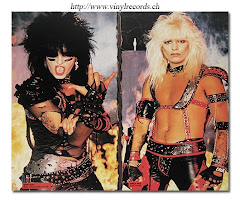Monday, September 28, 2009
Amit's Boyz n the Hood Blog Post
The three main characters in “Boyz n the Hood” represent positive, dangerous, and a mix of the two types of masculinities. When thinking of the positive masculinities that are depicted in the film, Tre’s journey to becoming a man comes to mind. His reluctance to be a violent gang member and the respect for women his father has instilled in him are shown as positive characteristics that make a man. In contrast to Tre’s character, is Doughboy’s struggle as a gang member. His reckless attitude and dependence on violence are seen as “dangerous” masculinities. Ricky, who seems to be a combination of the two, is the birth of the two mentalities. He is as determined as Tre is to be successful in a world without violence and gangs, yet he has the street knowledge his brother Doughboy taught him.
The role of race in depicting African American masculinities film is significant in that it helps describe how the masculinities came about--through the struggle and neglect African Americans face in south-central Los Angeles. The same types of personalities would not have been able to develop in a white family without the audience assuming some type of family disorientation or struggle, not the hardships of living in a ghetto as seen in Boyz n the Hood.
Surprisingly enough, Boyz n the Hood has some very strong notions about women in society buried underneath the masculinity of the film. The power both Tre and Ricky’s mothers have as the maternal figure goes along way in building their successful personality types. Yet at the same time, Boyz n the Hood shows how many women of south central are degraded at social events. Like at the barbecue, the women are seen as characters that only accompany the strength and support a man can support--almost seeming worthless on their own.
Similar to Don Sabo’s article “Doing Time, Doing Masculinity, Sports and Prison”, most of the character’s masculinities are revealed when they are around other men. For example, Tre’s natural extinct for revenge and being dangerous is something that is only unveiled by the end when Ricky falls to death. This notion is also related to Messner’s methodology of “doing gender” since he states that it can only be done at the expense of interacting with others, not as much as a biological instinct.
The role of race in depicting African American masculinities film is significant in that it helps describe how the masculinities came about--through the struggle and neglect African Americans face in south-central Los Angeles. The same types of personalities would not have been able to develop in a white family without the audience assuming some type of family disorientation or struggle, not the hardships of living in a ghetto as seen in Boyz n the Hood.
Surprisingly enough, Boyz n the Hood has some very strong notions about women in society buried underneath the masculinity of the film. The power both Tre and Ricky’s mothers have as the maternal figure goes along way in building their successful personality types. Yet at the same time, Boyz n the Hood shows how many women of south central are degraded at social events. Like at the barbecue, the women are seen as characters that only accompany the strength and support a man can support--almost seeming worthless on their own.
Similar to Don Sabo’s article “Doing Time, Doing Masculinity, Sports and Prison”, most of the character’s masculinities are revealed when they are around other men. For example, Tre’s natural extinct for revenge and being dangerous is something that is only unveiled by the end when Ricky falls to death. This notion is also related to Messner’s methodology of “doing gender” since he states that it can only be done at the expense of interacting with others, not as much as a biological instinct.
Subscribe to:
Post Comments (Atom)


No comments:
Post a Comment
Note: Only a member of this blog may post a comment.